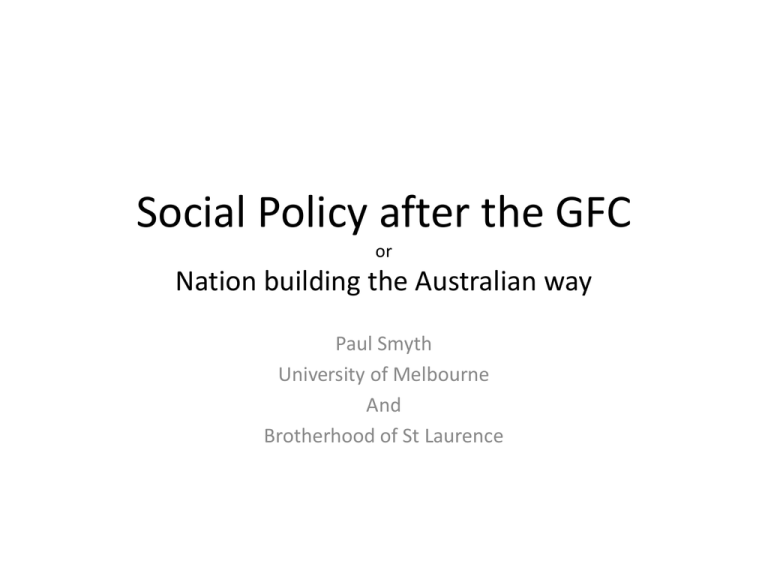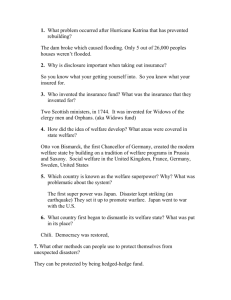Social investment in an Inclusive Society
advertisement

Social Policy after the GFC or Nation building the Australian way Paul Smyth University of Melbourne And Brotherhood of St Laurence Social policy and the gfc • • • • From neoliberalism to social democracy Social investment state Social inclusion agenda Reintegrating social and economic policy Social inclusion in Australia • • • • • • Slow take up Rural and place based disadvantage The poverty wars Sen, capability and positive welfare Social investment in human capital Minimise risk maximise opportunity UK’s EHRC (2007 • ‘An equal society protects and promotes equal real freedom and substantive opportunity to live in the ways people value and would choose, so that everyone can flourish. An equal society recognizes people’s different needs, situations and goals and removes the barriers that limit what people can do and be’ 1st 2 years of Rudd Government • Social Inclusion Board • Jobless families\ children at risk \ place based disadvantage \ homelessness \ employment for people with disability\ indigenous disadvantage • Joint Social Inclusion Action Plan • Jobless families\ disengaged youth\ children at risk\ place based disadvantage Longer term uncertainty • Principles: ‘Less disadvantage’\ ‘more participation’ • Give people voice\ responsibility\ strength based approach\ partnerships\ tailor services to individual need\ joined up services\ early intervention\ place based \ sustainable • Most people confused and wonder what social inclusion actually means From neoliberal to social democratic from Hilary Silver) liberal • Conception of integration • Source of integration • Ideology liberalism • Discourse underclass • Thinkers • Social policies specialisation exchange Locke \Smith Residual (charity) social democratic monopoly citizenship social\democratic inequality Marx\Marshall Universal (welfare state) Inclusive society in UK • Conservatives focus on ‘underclass’ solution : welfare safety net + families, communities and social entrepreneurs • Labour focus on the ‘whole of society’ Solution: public services as pillars of inclusive society; map resources citizens need across life course. A ‘New Social Contract’ Australia’s welfare mess • • • • • a ‘wage earners’ welfare state’ (1900s-) full employment basis of welfare (1940s-) Half a welfare state (1970s -) Neoliberal utopia: ‘Ending welfare’ (1990s) More spending than ever but no policy architecture (2000s-) A Compact for a Fair Go • From welfare state to social investment state (risks and opportunities over life course: early years\school to work\‘working years’\ retirement- ageing’) • Remake Harvester Judgement: ‘transitional labour markets’ framework • Use wage system? And /or welfare system? Compact for a competitive economy • The developmental state 1900- 1970s: Federation ‘social contract’ supported workers through living wage and public goods\ and employers through industry assistance for high wage path • 1980\90s neoliberal strategy for open economy. neoliberalism eclipsed • ‘Washington consensus reconsidered’: failed growth formula (Stiglitz, Krugman, Rodick) revisit the intervention menu: educationtraining- industry policies … • welfare states and globalisation: created incentives for investing in productivity ; and high quality workforce • Remaking the Australian way? Remaking the Australian way • Build on “3rd wave” of economic reform • Industry beyond ‘rocks and crops’ • Tackle low skill traps\ high performance work practices\ national training standards\ research and development\ innovation framework









